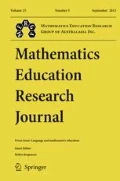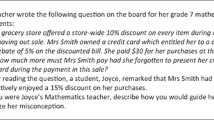Abstract
Student teachers who are recent migrants to Australia from non-English-speaking countries experience difficulties in mathematics method courses and in teaching practice, but there are no published reports of research into their difficulties. This paper reports on a preliminary investigation into how students with limited English skills perceive their problems and how they think courses could be adapted to meet their needs. Information was obtained from a questionnaire, by conversation with individual students, by observation of micro-teaching sessions and teaching practice, and from a student counsellor. The factor which most concerned the repondents to the questionnaire was the difficulty which pupils might have in understanding their speech. The results of the study highlight the present lack of resources to provide intensive training for student teachers in the use of specifically mathematical English. The teacher education course was identified as the only vehicle available to them for improving their English.
Similar content being viewed by others
References
Cockcroft, W. H. (1982).Mathematics counts. Report of the committee of inquiry into the teaching of mathematics in schools. London: HMSO.
Cummins, J. (1984).Bilingualism and special education: Issues in assessment and pedagogy. Clevedon: Multilingual Matters.
Department of Employment, Education and Training. (1989).Discipline review of teacher education in mathematics and science. Canberra: Australian Government Publishing Service.
Kolers, P. A. (1968). Bilingualism and information processing.Scientific American, 218 (3), 78–86.
MacGregor, M.E., & Moore, R. (1991).Teaching mathematics in the multicultural classroom. Melbourne: School of Science and Mathematics Education, University of Melbourne.
Mathematics Framework P-10. (1988). Melbourne, Vic.: Ministry of Education (Schools Division).
National Statement on Mathematics for Australian Schools. (1991). Carlton, Vic.: Australian Education Council and Curriculum Corporation.
Pimm, D. (1987).Speaking mathematically: Communication in mathematics classrooms. London: Routledge and Kegan Paul.
Reeves, N. (1990). The mathematics-language connection. In J. Bickmore-Brand (Ed.),Language in mathematics (pp. 90–99). Carlton South, Vic.: Australian Reading Association.
Segalowitz, N. (1986). Skilled reading in the second language. In J. Vaid (Ed.),Language processing in bilinguals: Psycholinguistic and neuropsychological perspectives (pp.3–19). Hillsdale, NJ: Erlbaum.
The language of mathematics. Ashfield NSW: TAFE Multicultural Education Unit.
Trent, F. (1990). Through the looking-glass: Cross-cultural professional education and staff development. In C. Hendrick & R. Holton (Eds.),Cross-cultural communication and professional education (pp. 55–59). Adelaide, S.A.: Flinders University of South Australia, Centre for Multicultural Studies.
Author information
Authors and Affiliations
Rights and permissions
About this article
Cite this article
Stacey, K., MacGregor, M. Difficulties of students with limited english language skills in pre-service mathematics education courses. Math Ed Res J 3, 14–23 (1991). https://doi.org/10.1007/BF03217224
Issue Date:
DOI: https://doi.org/10.1007/BF03217224




